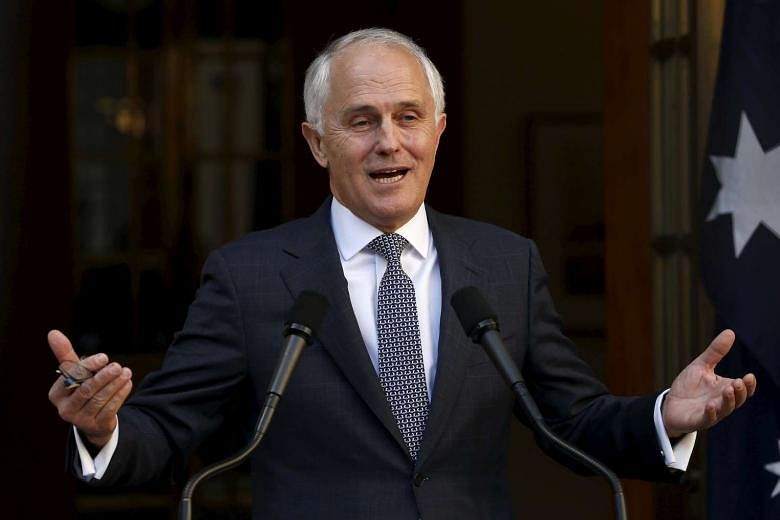Australia's new prime minister, Mr Malcolm Turnbull, has questioned China's growing assertiveness in the region and accused Beijing of "pushing the envelope in the South China Sea".
In his first detailed comments on China since ousting Mr Tony Abbott to become prime minister last week, Mr Turnbull said Beijing's recent conduct, such as land reclamation in disputed parts of the South China Sea, had been "counterproductive". He said Beijing's actions marked an unfortunate shift from its efforts to resolve border disputes via negotiations in the early 2000s and was prompting smaller nations in the region, such as Vietnam, to look to the United States for support.
"The pushing of the envelope in the South China Sea has had the consequence of exactly the reverse consequence of what China would seek to achieve," he said in an interview with ABC on Monday.
"You would think what China would seek to achieve is to create a sufficient feeling of trust and confidence among its neighbours that they no longer felt the need to have the US fleet and a strong US presence in the western Pacific."
Asked about the biggest threats to global security, Mr Turnbull referred to Islamic State in Iraq and Syria (ISIS), and to terrorism, before naming the risks of China's rise in the Asia-Pacific region. "In terms of our region what we need to ensure is that the rise of China... is conducted in a manner that does not disturb the security and relative harmony of the region," he said. "That requires careful diplomacy, it requires balancing."
Successive leaders in Canberra have grappled with the delicate task of simultaneously advancing ties with China, Australia's largest trading partner, while developing the close strategic bond with the US, Australia's closest ally.
Most analysts say Mr Turnbull's stance on China has evolved in recent years, as Beijing's own approach appears to have changed.
A foreign affairs expert at the Lowy Institute, Mr Sam Roggeveen, said Mr Turnbull would take a hardline towards Beijing where necessary. But he had a different mindset to Mr Abbott and would not be guided by an "emotional" connection to the US.
"Turnbull has very much embraced this idea that there is a massive power shift going on in the region and that the answer is not to simply embrace the US ever more closely," he told The Straits Times.
"Turnbull is a strong supporter of the US alliance but it won't be on an emotional level. It will be on a more utilitarian level."
Mr Turnbull has long shown a keen interest in China and has been widely praised for his extensive interest in foreign affairs. But his stance has been, as Mr Roggeveen said, that of a "classical realist".
Last month, several weeks before he became leader, he made extensive comments about China during a speech to a business forum.
Discussing China's role in World War II - it was the 70th anniversary of the atomic bombing of Hiroshima - he gave strong praise to China for courageously standing up to Japan. He suggested this demonstrated the lasting links between Australia, the US and China.
"It is vitally important for Australians, and Chinese, not to forget that in an epic struggle for the survival of our own nations, our own sovereignty, we were allies. It is important for Americans and Chinese to remember that too."
Mr Turnbull appears to have moved from having a relatively benign view of China's rise to expressing growing concern about China's increasing assertiveness.
Since deposing Mr Abbott, Mr Turnbull has acknowledged that issues such as ties with China require "agility". In that sense, his evolving position could be seen as a characteristically agile and realist response to China's recent actions.

